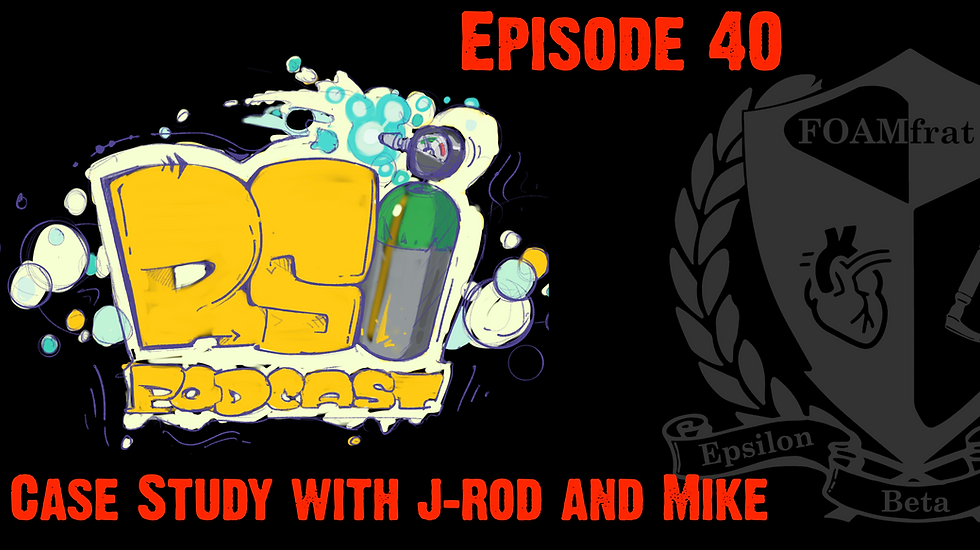Episode 40 - Case Review with Jared and Mike
- mike6356
- Oct 30, 2023
- 4 min read

81-year-old female
Past Medical History: Asthma, High Cholesterol, Fibromyalgia, Gastric Bypass, HTN, Hysterectomy, Knee Replacement, Rheumatoid Arthritis, Sleep Apnea, and TIA
Medication List: Albuterol, ASA, Clarinex, Hydrocodone, Lisinopril, Metrocolpramide, Nabumetone, Sertraline, Simvastatin, Xopenex, and other various vitamins.
Upon arrival on the scene, the crew is met by the patient’s live-in caregiver. It was reported that the patient had not been feeling or acting well, experiencing a ground level fall last night, complaining of trouble breathing. Another EMS crew was called last night with the patient presenting with complaints of shortness of breath but the crew had obtained refusal after helping the patient up (no trauma reported).
The caregiver reports deterioration with increased delirium and agitation since EMS’ encounter last night, so they called for EMS again — Which is our current crew the day following the refusal.
The caregiver is worried the crew will just sign the patient off again. Current EMS crew verbalizes that they will do everything they can to help. Caregiver is frustrated and believes the patient should have been transported last night.
Patient is in the back bedroom of her apartment propped up by another caregiver. Severe respiratory distress is noted and the patient appears very agitated reaching out to grab onto anything she can reach.
Attempt to gather vitals, but due to non-compliance and agitation, a GCS and RR are the only values obtained — GCS = 10, 4+2+4. RR - 36.
The patients home is described as a hoarders home with extreme clutter and a motorized scooter blocking access to the patient — unable to get the EMS cot to the patient. Additional help is attempting to declutter the apartment to allow for cot access. During this time, the following assessments are provided:
Confused
Dusky, pale color
Notably more edematous than normal
Fever reported, ongoing since yesterday
Possibly atraumatic, but hard to tell with patient movement and agitation
Vitals again attempted, but still difficult. HR - 180, SpO2 80% (possible poor reading), radial and carotid pulses are reported as very fast, irregular, and faint. Attempts to calm the patient are consistently made with no results.
NC is placed @ 10 LPM.
Another set of vitals is attempted and the patient is placed on the EMS crews cot. (This is approximately 8-10 minutes after arrival).
Patient loaded into the ambulance. Vitals: HR - 191, RR - 40, GCS - 10
ECG strip is obtained. Wandering baseline, moderate artifact, and overall poor reading due to patient movement. Skin is reported as flaking, peeling, with yeast present causing issues with ECG readings in addition to the patient’s movement.
ECG: Narrow complex, likely irregular.

Patient is difficult to find IV access due to edema, but access is made in each of the patient’s hands.
Attempts to place NRB are made. Patient agitation does not allow for continued placement.
Vitals again assessed. HR - 188, SpO2 89%, Temp - 102, GCS - 10
Crew identifies the patient as critical and discusses advanced directives with the caregivers/family. They report the patient has one, but it can’t be produced. EMS contacts local ER (while the patient is loaded) to further inquire about the patient’s advanced directives — no advanced directive on file at the hospital.
While speaking with the physician over the phone, the patient’s condition is discussed:
AMS
Fever
Edema, worse than normal
Air hunger — Shortness of breath
Failure to oxygenate
Hypotension
Discussion with the physician regarding correction of hypoxia and hypotension occur with RSI agreed upon. EMS and physician agree to use Etomidate and ROC for RSI.
Fluid bolus started. Blood glucose checked — 166 mg/dL. Patient continues with agitation still reaching for and grabbing objects — requires “hand to hand” restraint to keep her from pulling her IV out. EtCO2 NC placed.
Vitals: 179, SpO2 - 91%, EtCO2 - 33, RR - 36

Fluid administration of 1 liter did not improve patient mentation. Attempt to calm and reassure the patient continue to fail. EMS attempting to assist ventilation with (peds) bag mask ventilation to raise oxygen saturation prior to RSI.
Second IV started.
Medical direction again called as patient continues to deteriorate. RSI with continued fluid and levophed are discussed and agreed upon.
Levophed started at 4 mcg/min.
Vitals: HR - 179, SpO2 - 92%, EtCO2 - 33, RR - 23, GCS - 8 (3+2+3)
Patient reportedly deteriorates, requiring immediate RSI.
Vitals: HR - 197, BP - 113/59, SpO2 - 88, EtCO - 27, RR - 42
Patient’s SpO2 increases with bag mask ventilation, but the patient continues to fight against the intervention. Agitation and aggressiveness are not allowing the patient to appropriately pre-oxygenate. Crew considered pre-procedural sedation but withholds due to baseline hypotension — intervention is deferred.
Difficult airway is predicted per a LEMONS assessment.
Ramping precautions are taken for when the patient is induced and paralyzed.
Etomidate - 40 mg, ROC - 150 prepped.
Vitals: HR - 187, SpO2 - 96
Bag mask ventilation performed for nitrogen washout and pre-ox. NC stays in place at high flow for apneic oxygenation.
Vitals: HR - 160, BP - 165/135, SpO2 - 92, RR - 20
Etomidate and ROC administered.
Vitals: HR - 170, BP - 157/132, SpO2- 93%, RR -20
Successfully intubated within 30 seconds. Confirmed placement with EtCO2.
1 Minute later vitals: HR 127, SpO2 - 93%, EtCO2 - 15, RR - 20 by BMV, GCS - 3
Sudden drop in HR. Atropine is prepared. Placement is confirmed.
Vitals: HR - 75, RR - 18 per BMV, EtCO2 - 20, NIBP - Failed reading, SpO2 - Probe fell off.

Patient confirmed hypotensive and pressors continued. Levophed increased to 10 mcg/min — 10 mcg/min.
Vitals: HR - 75, BP - 60/42, SpO2 - 85%, EtCO2 - 17, RR - 16 BVETT
Repeat pressure again. Second liter started.
Vitals: HR - 74, BP - 89/58, SpO2 - 72%, RR - 14
Flow/patency of IV sites is questioned. IV push of saline confirms the site is blown. Both IV sites found to be unusable. Levophed and fluids stopped.
IO insertion being prepared. Change in patient color is noted. Carotid pulse becoming more and more faint. Pulse lost. CPR started.
IO inserted into the proximal tibia.
Lucas Device CPR. PEA in the 70’s.
EPI given
2 minutes of CPR - PEA continues
EPI and Bicarbonate are given
Arrives at ER. Ultrasound confirming no ventricular activity. Pronounced dead.








Comments